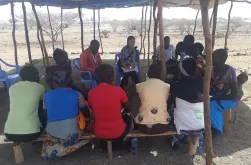More than 150,000 refugees and asylum-seekers live in Kakuma, a big settlement in northern Kenya. A UNHCR/UNV project has mobilized and trained refugee volunteers to solve problems faster and improve contact between the host and refugee community. The refugee volunteers have gained a sense of achievement thanks to the project.
Kakuma was founded in 1992 when large numbers of Sudanese and Ethiopian refugees poured into northern Kenya.
There are 500,000 refugees and asylum seekers in Kenya. Most of them live in two huge camps in the East and North of the country – Dadaab and Kakuma.
In January 2018, more than 185,000 refugees resided in Kakuma Refugee Camp. Residents of the camp suffer from a harsh, dry climate and a higher population than current capacities allow.
I have gained a sense of achievement. Volunteering has really impacted my life positively. --Daniel Ongejuk, one of the Community Outreach Volunteers with the joint UNHCR-UNV project 'Enhancing Security, Co-Existence and Refugee Protection through Refugee Outreach Volunteers'
The project is supported by the Government of Germany, represented by the Federal Ministry for Economic Cooperation and Development, and implemented by the Lutheran World Federation (LWF). The aim of the project is to enhance communication between support organizations, such as UNHCR, and ease tension between the local host community and the refugee community.
By June 2018, the project has mobilized 61 volunteers who represent all the different nationalities in the camp. The volunteers have been trained in community issues and services, such as public health, security, education, and gender-based violence. Further, women and youth fora have been established in three villages to increase community outreach.
The women and young people have been trained on concerns such as domestic abuse, school drop-outs and gender-based violence, and will continue educating and informing their communities on these issues.
The volunteers note conflict cases and report them to the appropriate focal persons. This contributes to the improvement of the camp’s residents’ overall well-being as issues can quickly be identified and solved.
In 2017, 96 conflict cases were reported and either handled by the volunteers themselves, managed by the community members, or referred to other organizations.
“We also help clean up public places”, says Daniel who has been in Kakuma since November 2016. “For example, we picked up rubbish from the market place. But we also just help other community members."
Daniel continues: "Our first activity, for example, was to rebuild the house of a widow. A window had been blown out and we replaced it so she could go back to live there.”
Daniel and his fellow volunteers identify problems and tensions within their communities and contact the appropriate people to solve the problem.
During a recent cholera outbreak in Kakuma, for example, he and his team trained the community members on hygiene practices to limit the outbreak as fast as possible.

The water situation in Kakuma camp, Kenya. (UNV, 2018)
Tensions and conflicts between the local Turkana people and the refugee community have been present for years and have been further exacerbated by environmental stress, limited resources, and a feeling that refugees are more economically privileged (as they receive aid that the local community does not).
To ease such tensions, the UNHCR/UNV project aims at utilizing the spirit of volunteerism to allow both host community and refugee community to participate in activities together, thereby enhancing compassion and understanding of each other.
The community volunteerism centre to host such activities was completed end of May 2018. Already, a football tournament has taken place at the centre to bring together communities from different villages.
Akie Tanaka is an international UN Volunteer from Japan who serves as an Associate Field Officer with UNHCR in Kakuma. She is coordinating the project's youth groups in Kalobeyei settlement in Kakuma.
Akie is convinced that bringing host community and refugee volunteers together can improve coexistence between the two groups.
One of our Host Community Volunteers has become a leading member. He is very active and helps both refugees and host community members and is encouraging other host community members to volunteer as well. This helps in promoting peace between host and refugee communities. --Akie Tanaka, UN Volunteer Associate Field Officer with UNHCR in Kakuma
Furthermore, she believes that volunteering has a positive impact on the young volunteers' well-being as well.
"At the beginning of the focus groups discussions, youth groups raised issues of the settlement, and later on they successfully brainstormed on what they could do to make their lives better and were very excited about the solutions they came up with," Akei shares. "They were much more positive by the end of the discussions and have had a positive impact on their communities."
Francis Namuya, a Senior Peace & Safety Officer for LWF agrees with Akie.
You could really see the despair in the eyes of the refugees in the focus group discussion when we were selecting them for the project. Before volunteering, the young ones would just be hanging around – but now they are transformed; they are really living the spirit of volunteerism and they love giving a service to people. They have a sense of achievement now. --Francis Namuya, Senior Peace & Safety Officer with LWF

